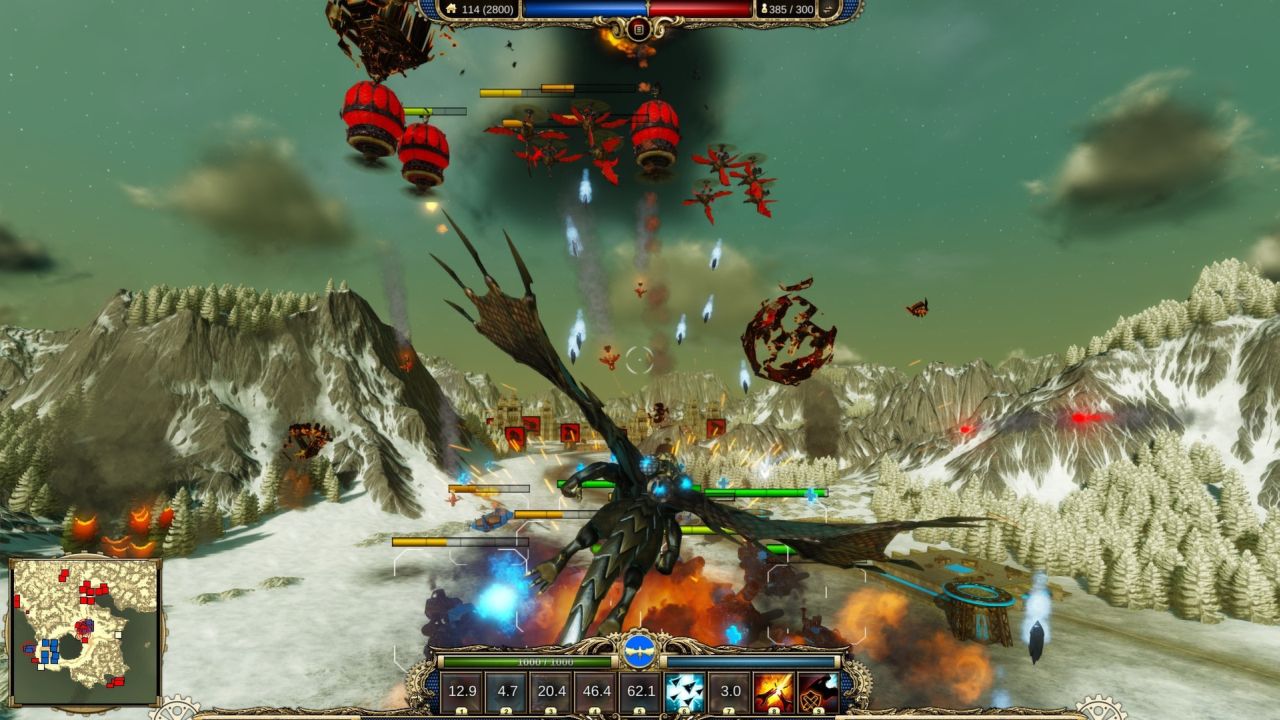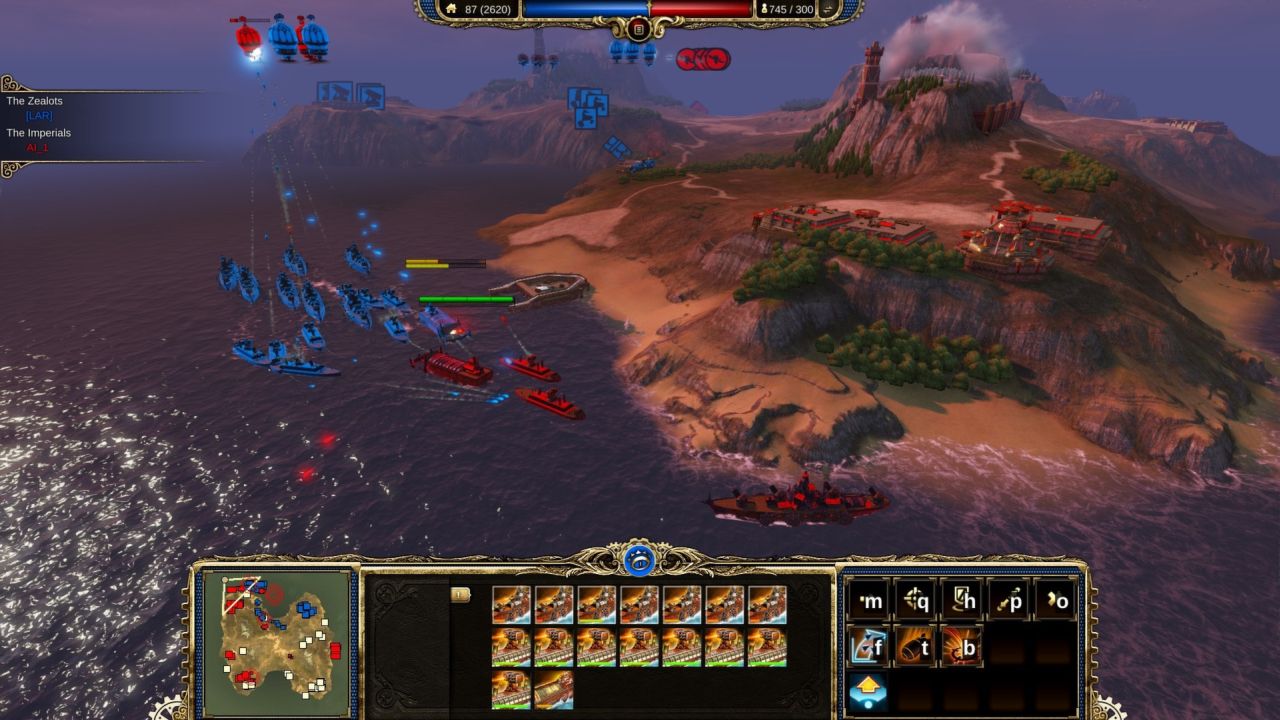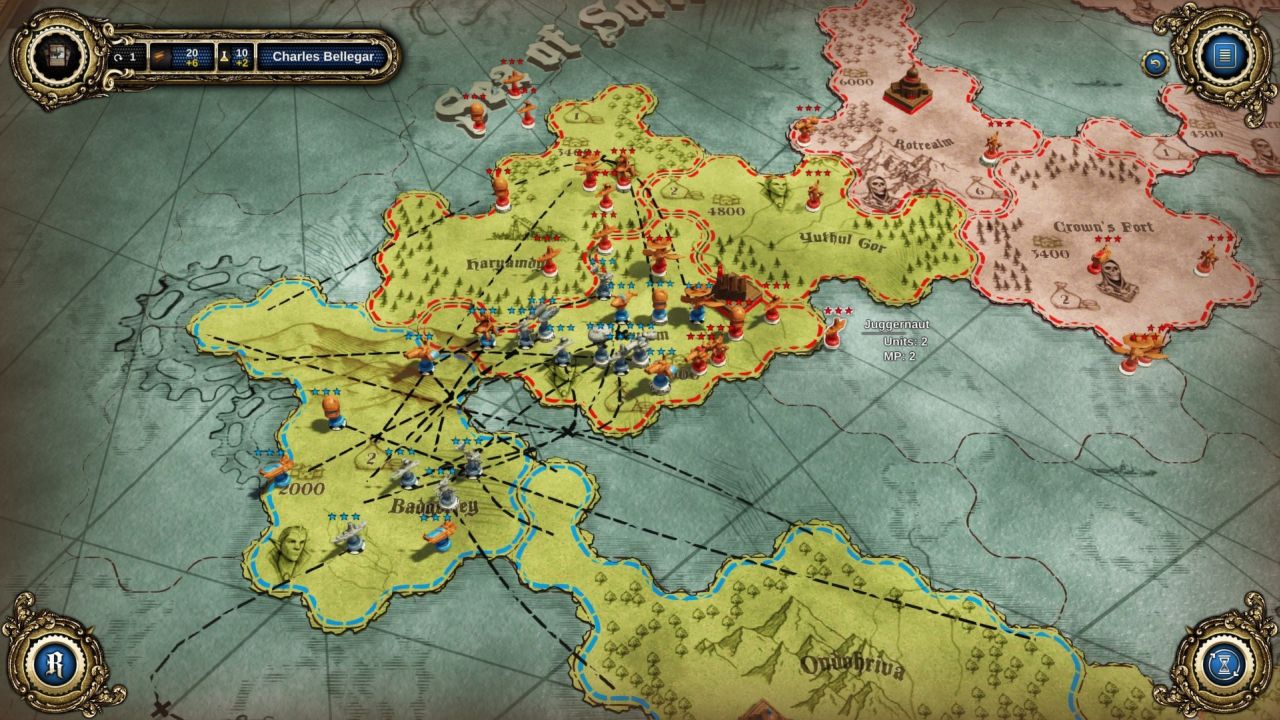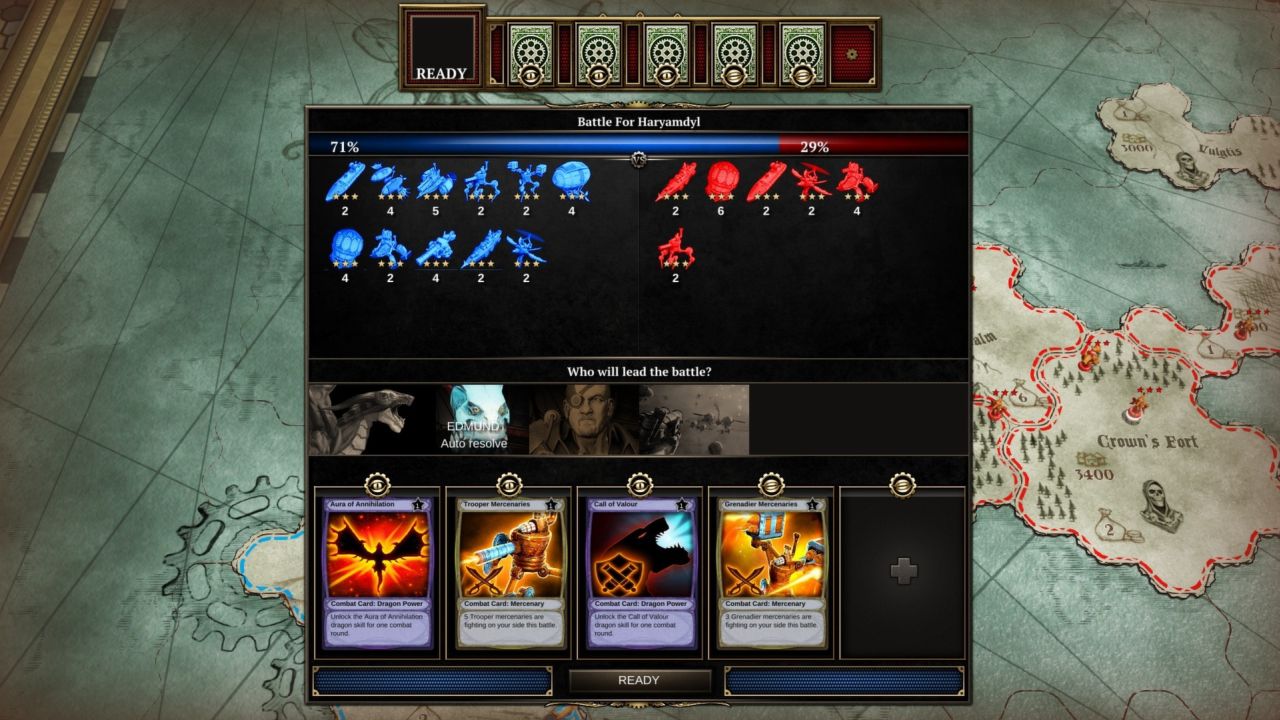Divinity: Dragon Commander Review
That's a dragon commander, not a commander of dragons
Here's a fun game to play on long journeys when your handheld of choice runs out of batteries: write down as many game genres as you can think of on a series of flashcards, shuffle them, pick out a handful, and take turns with your travel partner trying to think of the game that your selection resembles the closest. Dystopian stealth FPS RPG? Easy, that'll be Deus Ex. Retro sandbox survival horror? Er, Minecraft? Casual racing adventure simulator? Sounds like an evening with Euro Truck Simulator. If you're good at this (or easily entertained) this can go on for hours, but eventually your friend is bound to exhaust his reserves of patience and grab a fistful of cards in a last-ditch effort to stump you before the plane lands. Fortunately, as he holds up a hand comprising 'political RTS turn-based strategy action RPG flight-simulator' with a gaping grin, you now have the opportunity to momentarily pause, sip your beverage of choice, and exclaim "Ah, Divinity: Dragon Commander!" Then he hits you for being a smart-alec, but at least you were right.

So, Divinity: Dragon Commander, hereafter known as Dragon Commander thanks to my astonishing laziness and allergic aversion to punctuation in titles. It's steampunk o'clock in the stock fantasy land of Rivellon and the old emperor is dead, stabbed in the back by his own children on the account of him not being a very nice person and them being even less likeable. In traditional fashion they end up squabbling over the throne like a group of seagulls over a slice of bread and quickly escalate their conflict into a full-blown civil war. You - the bastard child of the emperor and a dragon in human form, and the only one among his heirs that didn't plant a knife between his ribs - are contacted by the wizard Maxos and burdened with the task of defeating the odious offspring. Along the way you must manage your armies on multiple scales, solve disputes among your generals and meet the demands of the various groups clamouring for your attention. Of course, many games can make claims to being multi-faceted, but they often just end up being clumsy; a mishmash of gameplay styles that should never have crossed paths, whereas Dragon Commander's various modes - from political dialogue to turn-based strategy, from real-time strategy to action RPG - all seamlessly fit together in one solid gameplay cake. But is it the kind of thing you really want to dig into?
Let's take the first bite. You spend your peaceful hours aboard the Raven, a magnificent steampunk airship, the splendour of which is marred slightly by the fact that you only get to see it from the outside once or twice in the whole game, but never mind that. This is where you do the busywork befitting an emperor-to-be, which usually involves visiting the wizard to upgrade yourself and visiting the cheeky imp in the engineering bay to upgrade your units. As the story progresses, you'll be called upon to consult with the representatives of the civilized fantasy races that the Divinity universe encompasses - elves, dwarves, imps, lizards and undead, with you representing humans - and make political decisions after hearing their thoughts. These decisions will curry favour with some representatives and alienate others, with resulting statistical benefits, but don't worry too much about balancing it: I regularly ticked off the ultra-conservative undead representative and as far as I can tell it never actually became a real problem. If I were to have one complaint about this system - and I do, thank you very much - it's the way so many of the decisions are so inexpertly ripped from current events. Family planning, freedom of the press, euthanasia, even medical marijuana gets a mention, the result being that during these segments Dragon Commander feels less like the distant past in a fantasy and more like a modern day setting where everybody is wearing extremely convincing masks.

One aspect of life aboard the Raven that does feel like it belongs in the distant past is the eventual selection of your queen. Functionally she's essentially a provider of extra abilities on the battlefield from time to time, as well as the source of extra dialogue which can affect your aforementioned favour with the various representatives, but there's something slightly unsettling about the way you have to pick your wife from a pool of four - lizard, undead, dwarf or elf - based on a paltry few lines said beforehand. In a game where the characters are mostly fleshed-out and properly introduced before you have to make any decisions regarding them, being put on the spot all of a sudden feels like a strange change of tack. Perhaps that's the idea. For the record, I ended up with the lizard princess, basing my choice on the fact that she was the only one among them that outwardly recognized how abhorrent an arranged political marriage was. She wasn't all that flirtatious, but somehow I don't think I was missing out on much.
We didn't come here to dally with princesses though, did we? No sire, we are at war! Dragon Commander loves its warfare so much that it isn't happy with just being a real-time or turn-based strategy title: it instead opts to delicately glue the two modes together, with interesting results. The overworld map takes the form of a sort of pseudo-board game, wherein you can manufacture armies and move them around Rivellon on a turn-by-turn basis. Conquering areas grants you more gold, recruits and upgrade points per turn, as well as the occasional extra structure with special attributes, so the game quickly becomes a confused rush to grab land and hold it. When two or more opposing factions occupy the same area, Dragon Commander flips a switch and goes into RTS mode, turning the armies currently loitering on the region into units that can be manipulated from the battle's beginning (although you can create structures and manufacture units during the battle, which you will need to do if they go on for too long). Combining the instant introduction of a truckload of units with relatively small map sizes, the RTS sections are typically fast and brutal, but as a result feel like the shallowest part of the game, becoming not much more than an excuse to mash your hordes of assorted units together and see who comes out on top. There's little else to do, really, what with the upgrade paths being shifted over to permanent RPG elements and the lack of anything resembling an economy system. I have the micro-management skills of a panda wearing oven gloves, so my preferred strategy is to select everything I have and attack-move my way over to the enemy base, and was amazed to find just how often this worked out in my favour, even when partially outnumbered.
That might have something to do with the final slice of Dragon Commander's combat, which allows ham-fisted buffoons like myself to play the hero and turn the tide of battle all on our own. Yes, the 'dragon' part of Dragon Commander finally comes into play, letting you transform into a fiery winged beast mid-way through RTS sections and swoop in to fix things up with a barrage of fireballs and magical abilities. It sounds gimmicky, as if Dragon Commander had taken a peek at Brutal Legend's notes in the exam and wondered if maybe it was onto something with an action focus, but this feature works surprisingly well: fly around, dash with your jetpack while dodging enemy attacks, cast spells to heal or buff your allies, rip into priority targets that your foolish underlings have failed to get rid of, so on and so forth.
You quickly learn to fear and despise anti-air units, though, and in larger battles it's hard to get into the fray for more than a second or two before chunks of overgrown airborne lizard start raining down on the landscape. Being killed doesn't actually do anything significant though - it just boots you back to RTS mode with a small penalty - so the question that arises is why you would ever not want to enter dragon mode. Simple answer? Controlling your units from this perspective is about as intuitive and accurate as performing open heart surgery with a forklift. You can make various selections and point to a specific location that needs to die, so in theory it should have been perfect for me and my oven-glove strategies, but aiming somewhere very specific on the battlefield that may or may not be within view with enemy ground-to-air missiles on your tail is a daunting task, if not practically impossible, and in any case doing anything so complex as manufacturing more units or managing control groups will require a three day course in the relevant key binds, so as soon as you've exhausted your dragon's arsenal it's back to good old eye-in-the-sky mode for some more exciting attack-move action. As an aside, I'd like to know why exactly I need twenty recruits in order to spawn my dragon. It's probably for balance reasons, but what's the canonical explanation? Does the emperor-to-be need a team of masseuses on standby to give him a back-rub before he feels sufficiently motivated to lend a helping hand? Or, on a more sinister note, just how much do dragons eat before flying into battle, anyway?

A strategy game isn't a strategy game unless you can pit yourself against an opponent other than a slab of silicon and some wires, so in deference to this Dragon Commander packs some multiplayer options. You can play through an entire campaign if you're stark raving mad - that is to say, the whole turn-based map, complete with research and upgrades and only minor tweaks to the single player gameplay - or you can play a skirmish match, which is just the RTS mode with standardized units. Since both options are essentially just Dragon Commander's single player modes with squishy fleshlings taking the place of your opponents, whether they're any good is decided largely on whether you enjoyed the single player. If you did, congratulations, because you're about to receive more of the same. If you didn't, it certainly won't give you an epiphany. Skirmishes also seem to suffer from a touch of the old lag, though this might have just been the fact that I'm probably geographically closer to the magnetic South Pole than I am to our good friends in the United States, where the majority of the games were likely being hosted. I'd have loved to choose a host closer to home, but Dragon Commander's pitifully small community means that you really can't be picky when it comes to which strangers you spend your quality time with.
Dragon Commander is a game full of good ideas and not-quite-as-good execution. Strategising through the various layers of gameplay is a challenge for the grey matter and gives the game some proper depth, but after a while it begins to feel a bit thinly-spread, as if it's trying to cover too many bases and can't quite maintain a high standard across all of them. It does something new and interesting, and for that Larian Studios ought to be applauded, but with new ideas come new problems. Having the real-time and turn-based aspects of the combat influence each-other worked wonders for making me think about what I was doing from a different angle, but it ended up creating a lot of frustrating or just downright dull RTS sections when either my opponent or I had vastly more units than the other on the game board, resulting in the player with the most initial units simply zerg-rushing their unstoppable war machine to victory against a handful of knock-kneed troopers with pea shooters. Furthermore, while having the turn-based combat board encompass everything might seem grandiose, it does mean that if you make a foolish decision - one that will, for example, eventually lead to your demise - it can be up to an hour before you realize you've painted yourself into a corner and the enemy is knocking on your front door. An hour of gameplay down the drain, because you sent a transport ship to the wrong zone or bought the wrong type of units. Now that's a true test of patience: none of this faffing around with conservative checkpoint systems like Shadowrun Returns, just the sudden pit in your stomach as you realize how much story and gameplay you'll have to relive thanks to your own stupidity. Oh well, perhaps I'll pick up the elven princess this time. She seemed like the friendly sort.

More than anything else, Dragon Commander earns its wings on the phenomenon of novelty. Some parts are good, some are mediocre, and there's no particular aspect of it that will blow you away, but the seamless integration of gameplay modes is presented compellingly enough to scrape by. If nothing else, buying Dragon Commander signals to developers that you're not afraid to buy something just because it can't be easily pigeon-holed, and in my book that's a definite step forward for society. Who knows, you might even enjoy it enough to make it your choice of time-sink for a while - I know I did - which will create some much-needed comfort when your travel partner refuses to play genre-flashcard charades with you any more.
 Comments
Comments













